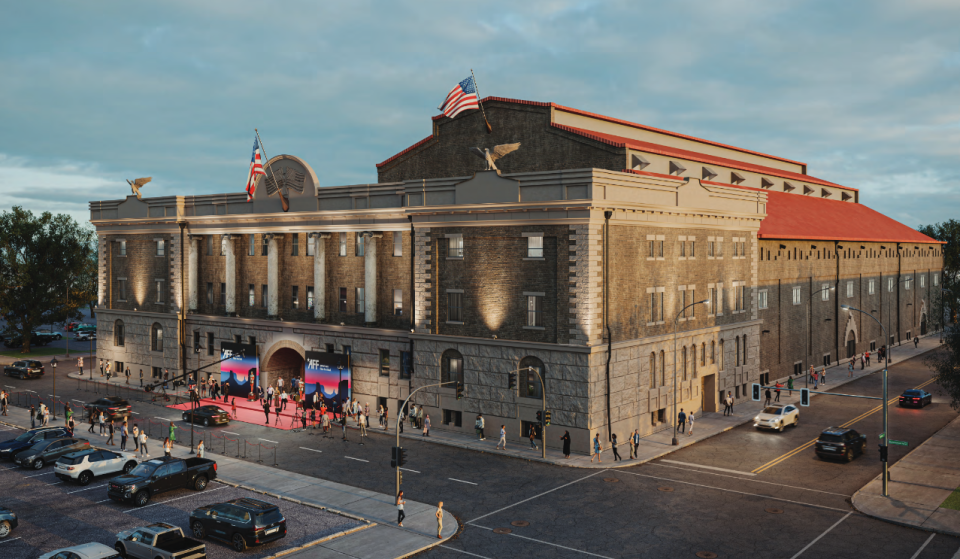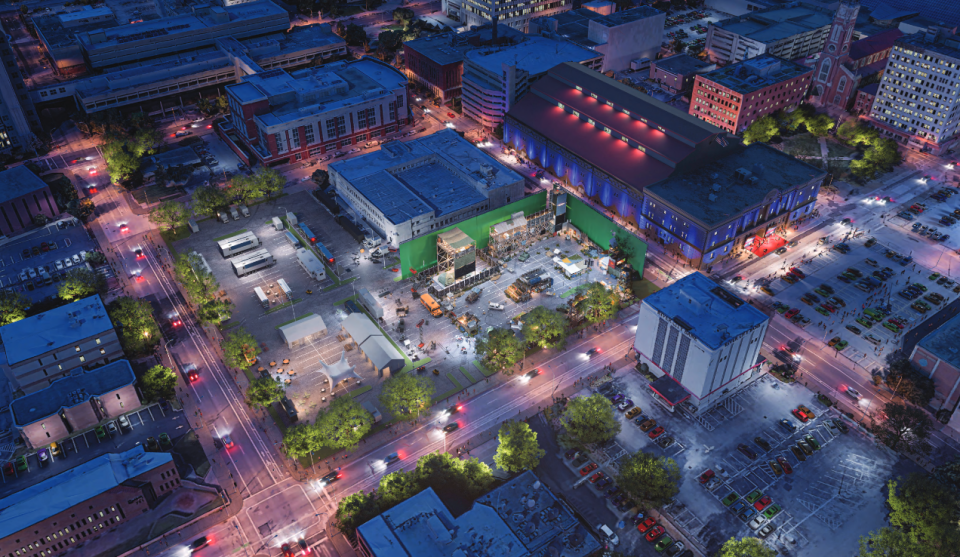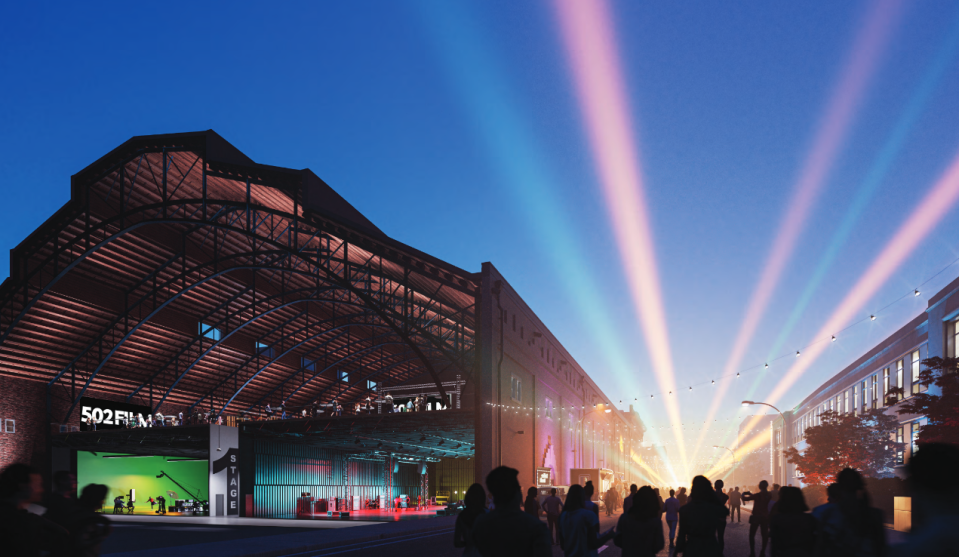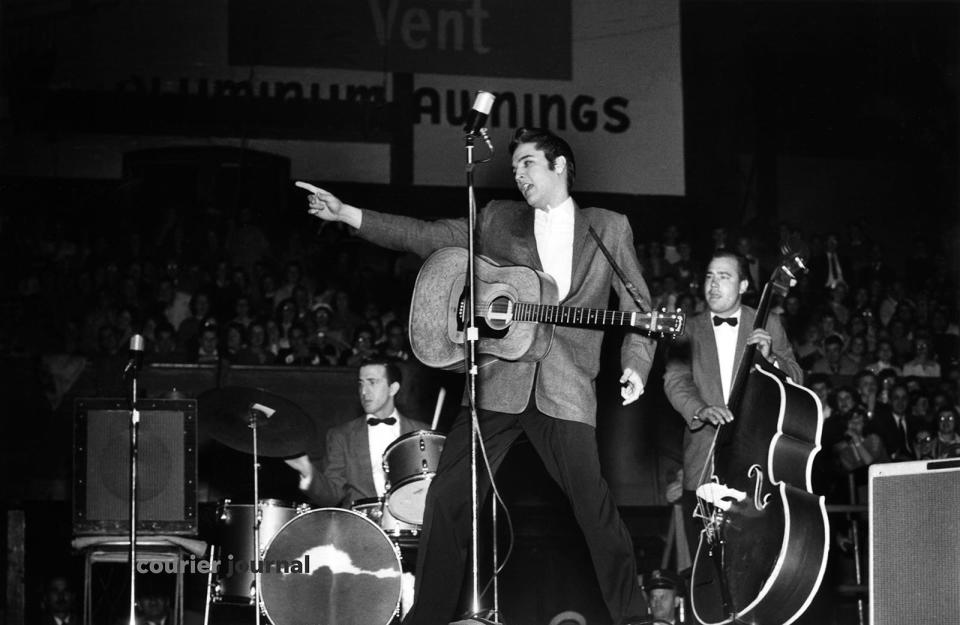Long-vacant Louisville Gardens is getting new life at last. Here's the plan
Do you remember the last time you attended a concert or sports event at the Louisville Gardens?
It's been 16 years since the historic venue has seen much action, but soon the vacant building should be buzzing with activity and the words, "lights, camera, action."
After sitting idle for nearly a decade, Louisville Gardens at Muhammad Ali Boulevard and Fifth Street would be transformed into a production house with sound stages for film, music and digital production, under a proposal from River City Entertainment Group LLC.
Louisville Mayor Greg Fischer said he hopes the building becomes a “haven for our creative economy.”
“It’s a long time coming,” Fischer said. “It took a lot of patience to get here … The redevelopment of this signature downtown building has been a goal of my administration since day one.”
Omni Hotel:With Omni's unveiling and more buzz downtown, leaders envision Louisville Gardens rebirth
River City Entertainment Group reported an anticipated minimum investment of $60 million in the project, said Scott Hodgkins, who along with Tony Guanci are principals of the company.
In states like Georgia and Louisiana, where thriving film, television and music industries are booming, old automobile factories, warehouses and abandoned buildings have been transformed into sound stages like the one planned for the Louisville Gardens.
The redevelopment is expected to include four stages (two larger stages for film and television and two smaller stages) inside the shell of the old armory, totaling 40,000 square feet of production space.

Outside, the structure would be restored to the original design of the Louisville Armory, as it was when built in 1905.
The proposed renovation will also include 40,000 square feet of office space to be leased by production companies. A museum to memorialize the venue's storied history is planned, as is a small retail space and a restoration of the upstairs black box theatre for concerts and band rehearsals.
"This is exciting for creatives across the city and those I believe will someday call Louisville home," said Soozie Eastman, Louisville Film Commission chairperson and president of 502 Film Collective. "Since the 2022 entertainment tax incentives we've already seen a huge uptick in production with the approval of 58 films which resulted in more than 6,000 Kentucky-based hires."
In Atlanta, there are more than 60 sound stages, and that number is on the rise. The Georgia State film incentives combined with a constellation of entertainment businesses that located in Georgia to support production has turned the city into the "Hollywood of the South."
Related:$20M makeover of Louisville Gardens proposed
Growing Louisville's entertainment industry
It was 2006 when Louisville's Grammy nominated My Morning Jacket performed the last concert at Louisville Gardens. Since then it's been mostly used as a storage facility. Kind of a sad outcome for a building listed on the National Register of Historic Places.
But today with the proposed renovations and plans for adaptive reuse of the building, the Louisville Gardens could be reopening its doors in four years as an exciting venue to attract new industry to Jefferson Country.
"The entertainment industry in our city is growing, and with this project we can elevate the industry to the level of other signature industries, attract creatives and young people to our city and add to our already stellar entertainment and arts industry," Fischer said. "This investment means investing in a whole new industry. It will be an incredible space once it's finished."

Louisville Metro Government, which owns the property, signed a letter of intent with River City Entertainment Group on Dec. 9.
Per the agreement, the two are entering into “good faith negotiations” to work out a development agreement within 180 days (with an option to further extend the period by another 180 days). That agreement would spell out timelines and terms of the project, including financing.
Developers indicated they intend to sign a long-term lease with the city.
Part of the proposed redevelopment would also involve the state-owned block next to Louisville Gardens, bound by Sixth, Seventh and Cedar streets and Muhammad Ali Boulevard.
Developers said in their letter of intent that they’d seek to buy or long-term lease the land for use as an education facility for careers in audio and film production, in partnership with local colleges and universities.
The project is contingent on funding, its developers told The Courier Journal. Securing state and federal incentives will be key to making the vision a reality, Hodgkins said.
"There are some restoration credits and some environmental credits and incentives that are not yet awarded that we're going to need in order to do the heavy lift, which is to getting this back into a position where you can build," he said in an interview with The Courier Journal.
The development secured preliminary approval for $700,000 in jobs-related tax incentives over a 10-year period at the Dec. 8 Kentucky Economic Development Finance Authority board meeting, said Brandon Mattingly, spokesman for the Kentucky Cabinet for Economic Development.

This incentive is through the Kentucky Business Investment Program, which can provide income tax credits and wage assessments for companies that locate or expand in the state.
Finance authority records show developers have a target of creating 50 jobs at an average hourly wage of $58 (including benefits).
Hodgkins said Friday the production studio would directly employ 50-100 workers. Beyond that, production companies using the space would bring in their crews for weeks or months, contributing to the local economy.
"That's the real opportunity we think this presents to the city," he said.
Louisville Gardens a backdrop to great moments
Built in 1905, the 6,000-seat venue in downtown Louisville was first known as the Jefferson County Armory. It has hosted events and speakers, including Dr. Martin Luther King Jr. in 1960. Harry S. Truman spoke there during his 1948 Presidential campaign, and Elvis Presley played the venue in 1956.

The building has also seen its share of graduations, basketball and ice hockey games. One of the last events held there was the Louisville Invitational Tournament for boys' basketball in January 2009. University of Louisville, University of Kentucky and professional teams also played there over the years.
Designed in the Beaux Arts-style by Louisville's Brinton B. Davis, the venue at 525 W. Muhammad Ali Blvd. cost $440,000 and was home to the Louisville Legion militia battalion. When it opened, it was the largest building in Kentucky.
Jefferson County spent $2 million in 1963 on a conversion project and renamed the building Louisville Convention Center. Its name was changed again to Louisville Gardens in 1975 to avoid confusion with the Commonwealth Convention Center being built a few blocks away. In 1998, it became The Gardens of Louisville.
It was used as a refugee area during the Great Flood of 1937 and as an assistance center for evacuees from Hurricane Katrina in 2005. A memorial service in the wake of the Titanic disaster was held there in 1912. Eastman Kodak and other corporations held national conventions there over the years.
A Tommy Dorsey Orchestra performance was broadcast nationally in 1936. Other performers who appeared there include Igor Stravinsky, Ray Charles, Stevie Wonder, Bob Dylan, Tom Petty, Red Hot Chili Peppers, Aaron Copland and Pearl Jam.
Sports teams at the Gardens
U of L: The Cardinals called it home starting in 1945, before moving to Freedom Hall after it opened in 1956. They continued playing some games there through 1972, and they won 87% of their games in the building − 153 wins and 23 losses.
Hockey: An ice rink was installed in 1948, and it became home to the Blades hockey team, which won the International Hockey League championship but folded a year later. The team was resurrected as the Stars for about half the 1954 season and returned in 1957 as the Rebels, which also gave up in 1961.
Basketball: Kentucky Colonels, Louisville Catbirds, Kentucky Stallions and Louisville Shooters, all professional teams, played home games there.
Other: Wrestling matches and miniature car and roller derby races also were held there.
Reach features reporter Kirby Adams at kadams@courier-journal.com. Business reporter Matthew Glowicki can be reached at mglowicki@courier-journal.com, 502-582-4000 or on Twitter @mattglo.
This article originally appeared on Louisville Courier Journal: Historic Louisville Gardens being transformed into production house

